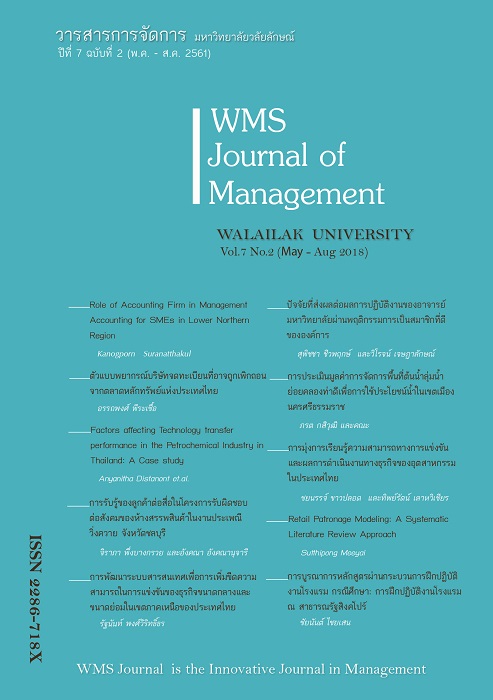Curriculum Integration through Practical Training in Hotels: A Case Study Internships at Singapore Hotels in Hospitality Management Students of the Faculty of Hospitality and Tourism, Prince of Songkla University, Phuket Campus
Main Article Content
Abstract
The practical training in the service industry business both domestically and internationally is of importance to support students’ basic knowledge, positive attitude and working skills. Therefore, this study sets its objectives to present internship operations and management in Singapore with feedbacks and suggestions from immediate supervisors, students and lecturers. Moreover, best practices and key success factors to develop hotel internship in Thailand in order to increase the student’s competencies and capabilities for 21st century skills.
The accumulated results reveal that Faculty of Hospitality and Tourism students have the potential to perform the position tasks in the Singaporean including the ability to use both theoretical knowledge and practical skills learned in the classroom. Moreover, students can continue to enhance their English skills in the performance of their duties. However, the faculty should prepare additional creative thinking courses, accompanied with supplementary practical life skill courses. Examples: grooming, character development, confidence building, brainstorming interactive skills, decision making, and interpersonal skills in communication with colleagues and customers. In conclusion this paper will suggest that educational institutes and stakeholders in Thailand should emphasize student’s preparation focusing on key skills prior to applying to an internship site and graduation in order to access their studied profession of hotel services industry for both domestic and international effectively.
Article Details
References
กระทรวงแรงงานสิงคโปร์. (2015). รายชื่อสถาบันการศึกษาที่ได้รับการรับรอง. สืบค้นเมื่อ 8 กันยายน 2559, สืบค้นจาก http://www.mom.gov. sg/passes-and-permits/training-employment-pass/list-of-acceptable-institutions#/.
กองเศรษฐกิจเศรษฐกิจการท่องเที่ยวและกีฬา. (2560). รายงานภาวะเศรษฐกิจท่องเที่ยว ฉบับที่ 6. สืบค้นเมื่อ 10 มกราคม 2560, สืบค้นจาก http://secretary.mots.go.th/policy/ewt_ dl_link. php?nid=1750.
ชลลดา มงคลวนิช. (2555). ความพึงพอใจของนักศึกษาที่ปฏิบัติงานในธุรกิจบริการตามระบบสหกิจศึกษา. วารสารการบริการและการท่องเที่ยว, 7(1), มกราคม-มิถุนายน 2555, 67-82.
นภาพร จันทร์ฉาย และคณะ. (2558). การประเมินคุณภาพบัณฑิตระดับปริญญาตรี หลักสูตรอุตสาหกรรมท่องเที่ยว และบริการตามกรอบมาตรฐานคุณวุฒิระดับอุดมศึกษาแห่งชาติ พ.ศ. 2552. วารสารวิจัย มสด สาขามนุษยศาสตร์และสังคมศาสตร์, 11(1), มกราคม-เมษายน 2558, 181-196.
ประวิตร วงษ์สุวรรณ. (2559). ยุทธศาสตร์การพัฒนากำลังแรงงานในอุตสาหกรรมท่องเที่ยวและบริการ พ.ศ. 2560-2564. สืบค้นเมื่อ 8 สิงหาคม 2559, สืบค้นจาก http://www.dsd.go.th/DSD/Activity /ShowDetails/23092.
วิจารณ์ พานิช. (2555). การผลิตบัณฑิตในศตวรรษที่ 21. สืบค้นเมื่อ 21 มิถุนายน 2558, สืบค้นจาก http://fda. sut.ac.th/doc-training/budit21.pdf.
Chen, T. L., & Shen, C. C. (2012). Today's intern, tomorrow's practitioner?—The influence of internship programmes on students' career development in the Hospitality Industry. Journal of Hospitality, Leisure, Sport & Tourism Education, 11(1), 29-40.
Chen, Y. Y. (2015). Successful Training Classes for Overseas Internships-Singapore Overseas Internship Success Stories at Tajen University. International Journal of Business and Commerce, 4(5), 1-19.
Cheng, S., & Wong, A. (2015). Professionalism: A contemporary interpretation in hospitality industry context. International Journal of Hospitality Management, 50, 122-133.
Chung, K. Y. (2000). Hotel management curriculum reform based on required competencies of hotel employees and career success in the hotel industry. Tourism management, 21(5), 473-487.
Fong, L. H. N., Luk, C., & Law, R. (2014). How do hotel and tourism students select internship employers? A segmentation approach. Journal of Hospitality, Leisure, Sport & Tourism Education, 15, 68-79.
Koc, E., Yumusak, S., Ulukoy, M., Kilic, R., & Toptas, A. (2014). Are internship programs encouraging or discouraging?—A viewpoint of tourism and hospitality students in Turkey. Journal of Hospitality, Leisure, Sport & Tourism Education, 15, 135-142.
Kim, H. B., & Park, E. J. (2013). The role of social experience in undergraduates’ career perceptions through internships. Journal of Hospitality, Leisure, Sport & Tourism Education, 12(1), 70-78.
Li, L., & Li, J. (2013). Hospitality education in China: A student career-oriented perspective. Journal of Hospitality, Leisure, Sport & Tourism Education, 12(1), 109-117.
Zopiatis, A. (2007). Hospitality internships in Cyprus: A genuine academic experience or a continuing frustration?. International Journal of Contemporary Hospitality Management, 19(1), 65–77.
Zopiatis, A., & Theocharous, A. L. (2013). Revisiting hospitality internship practices: A holistic investigation. Journal of Hospitality, Leisure, Sport & Tourism Education, 13, 33-46.
Wang, Y. F., Chiang, M. H., & Lee, Y. J. (2014). The relationships amongst the intern anxiety, internship outcomes, and career commitment of hospitality college students. Journal of Hospitality, Leisure, Sport & Tourism Education, 15, 86-93.

